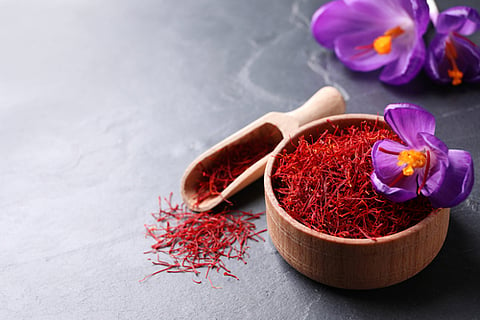
- Destinations
- Experiences
- Stay
- What's new
- Editor’s Picks
- Responsible Tourism
- CampaignsCampaigns
- Subscribe

Purple crocus flower fields in Pampore, Kashmir, are surrounded by towering snow-capped mountains. This blossom is the source of the priceless spice saffron. With more than 20,000 households engaged in saffron farming, Pampore, a tiny town 14 kilometres from Srinagar, is referred to as the 'saffron capital of India'. The saffron grown in the area is of the highest quality and sells for up to Rs 250,000 per kilogram. The complex process of increasing saffron is what makes the spice so expensive. The locals begin the process by picking tiny flowers and gathering them in wicker baskets.
The three components of each flower&mdashpetals, yellow strands, and red threads&mdashare arranged in order of importance. Pure saffron is extracted from the red strands. More than 1,50,000 flowers are sifted and scanned for a kilogram of the crimson spice. After this, the strands are dried over a charcoal fire. Saffron, one of the most expensive spices in the world, is also referred to as the "crop of gold".
It is said to have been introduced in Kashmir by Sufi saints Khwaja Masood Wali and Hazrat Sheikh Sharif-ud-Din.
The harvest time for saffron is around November. This is when Pampore's meadows attract tourists from everywhere to witness the yellow, marron, and purple hues of the blossoms that bloom beside giant chinars. And harvest time resembles a festival for villages in the area. On the first day of the harvest, saffron farmers head to the shrine of Hazrat Sheikh Sharif-ud-Din in Namblabal Pampore to offer some saffron.
These fragrant red strands have even featured in the poems and songs of the 16th-century poet Habba Khatoon. Known as the Nightingale of Kashmir, Khatoon hailed from Pampore.
This spice is known by various names in India, including zafran in Urdu, kesar in Hindi, kong posh in Kashmiri, and kungumapoo in Tamil. Saffron is used in different ways. There's kahwa - the green tea laced with saffron from Kashmir. Beloved by many, it will make you fall in love with it at one sip. With spices like cardamom and cinnamon, this elixir is slowly brewed in a copper samovar. It is then served with a touch of honey and often garnished with almonds. It is also an important part of wazwan, the lavish Kashmiri supper platter.
Saffron is used in cooking, but it also offers many health advantages. The oil from which safranal is produced reduces growth in cancer cells and functions as an anticonvulsant and antidepressant. The carotenoid alfa-crocin also has a similar effect. Minerals are also abundant in it, including potassium, manganese, iron, calcium, selenium, copper, zinc, and magnesium. Additionally, it is high in folic acid, niacin, riboflavin, and vitamins A and C.
Every year, the government of Jammu and Kashmir organises a three-day Saffron Festival with cultural events. Held from the last week of October, it gives tourists a chance to see saffron fields and buy the spice directly from producers.
The Struggles of Saffron in the Valley
The Kashmir Valley has a long and storied history of saffron use. However, lately, Kashmir has seen a decline in prized saffron due to several natural factors, including drought and a lack of irrigation. The soil has become dry and unsuitable for agricultural growth due to climate change. Iranian saffron has also arrived in the area, and due to its affordable price, it is frequently sold under the name of Iranian saffron.
However, despite all the difficulties and tribulations, the saffron business still employs thousands of people in Kashmir. The government is taking several steps to resurrect the sector and restore it to its former glory. The national government started the National Saffron Mission in 2010 to revive the valley's production of the most costly spice in the world.
Additionally, independent organisations like Kanz and Mul, New Kashmir Agro, and Urban Kisaan are working hard to preserve, advance, and establish a significant position for Kashmir's saffron business in the global market.
